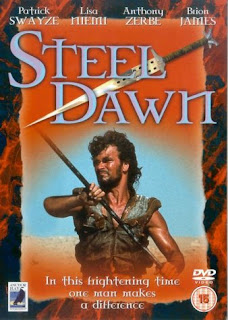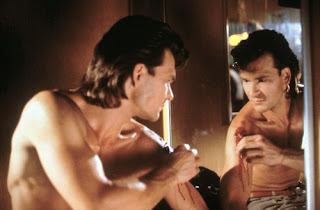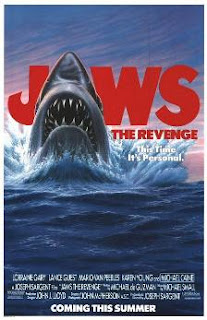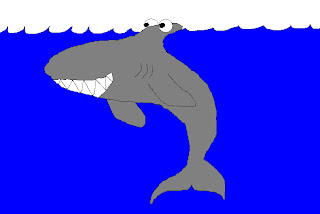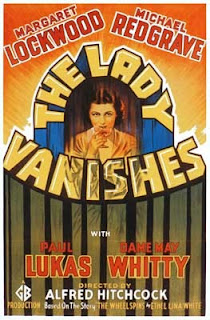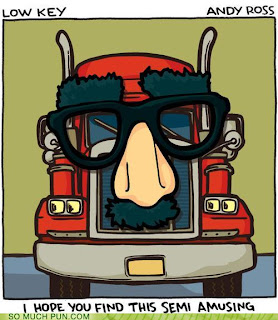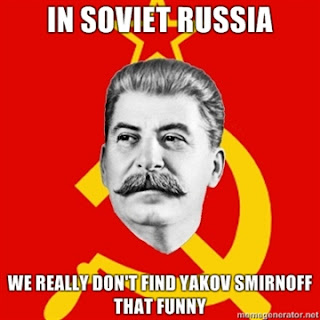The very first thing that struck me about this movie is its score.
As is his custom, John Carpenter wrote the score, as well as writing and directing this movie. It's not magical or sweeping, like something from John Williams or Danny Elfman, but it's pretty ominous for 70s synthesizer music and I think it still stands the test of time.
On his first day working after a promotion, Lt. Ethan Bishop (Austin Stoker) is asked to babysit the all-but-officially closed down Precinct 9, District 13 (the title is amusingly inaccurate) police precinct in Anderson, Los Angeles. I'm not sure if Anderson was ever a real neighborhood in LA (I can't find anything to confirm or deny it), but in this movie, it is a gang-infested ghetto. Normally, this kind of assignment would be pretty dull --- answering phones, directing people to the new precinct, that sort of thing --- but Bishop and his skeleton crew (two secretaries and a police captain) is in luck. And by "luck," I mean "a lot of trouble."
The first sign that the night will be a little unusual is when a prison transport truck stops by. Officer Starker (Charles Cyphers) is forced to stop at Precinct 9 because one of his prisoners is extremely sick and possibly contagious. He takes sick boy into a holding cell and does the same for Wells (Tony Burton) and the death-row-bound Napoleon Wilson (Darwin Joston). That would be unusual enough, but things are about to go from "unusual" to "terrifying" in a matter of minutes.
The day before, the LAPD ambushed and killed several members of the Street Thunder gang; it seemed pretty unsportsmanlike at the time, but both sides were more than adequately armed. The Street Thunder then made a blood oath to go nuts on the city, particularly the LAPD. They call this blood oath the "cholo," which confused me for a while, but I suppose the meaning has changed over time.
 |
| This movie has no awkward dancing, I promise. |
Anyway, the Street Thunder started their day with the intention of stirring things up --- TO DEATH!!! They pulled out some ridiculously heavy artillery (for a list of weapons, check out the imfdb, the existence of which kind of weirds me out) and decided to go kill...an ice cream man? Um. Okaaay. That's pretty random. Only moments before, a little girl had gotten a cone from that ice cream man, but realized it was the wrong flavor, so she went back to complain. Sorry, sister, your timing is awful. The gang member shoots the kid dead. Now, you may assume that this was an off-screen kill, something that was implied. Nope.
 |
| She dead. |
If you're familiar with John Carpenter movies, then you probably know the kind of acting in store for you here. Carpenter is certainly not a bad director, with respects to how he handles the talent, but many of his movies are more about the plot than the acting. Such is the case here. Austin Stoker is fine as the heroic lead, but he's nothing special. Instead, the movie focuses more on the outlaw hero of the film, Darwin Joston. Joston's character is shockingly calm throughout the movie, despite the threat of death constantly hanging over his head, from both the gang and the state; his delivery is very droll, monotone even, and reminded me of Ron Livingston in Office Space. I would have loved Joston's character if he ever had a line of dialogue that wasn't a quip; his recurring "got a smoke" line felt out of place and was kind of annoying. The rest of the cast was fine, if unspectacular. Frequent Carpenter collaborator Charles Cyphers (the sheriff from Halloween) gave a typically appropriate performance as a not particularly nice transport guard. Ron Livingston, of Rocky fame, was solid as a high-strung prisoner that didn't want to die. The two secretaries, Nancy Loomis and Laurie Zimmer, were also decent in their roles. You might have noticed that I haven't mentioned any gang members. None of them have any dialogue and, aside from the one who shot the girl and was killed, none really stick out in my memory.
 |
| Prisoners smell bad, apparently. |
John Carpenter did a fantastic job making this movie as good as it is with what he had t work with. The pace is good, the special effects (such as they are) are believable, and the writing...well, the dialogue isn't great. The story is good, though, and that's what matters. You might recognize the basic idea behind Assault on Precinct 13 --- heroic policeman fighting off a large opposing force with little to no help --- from the classic Western Rio Bravo. From what I can tell, that comparison was intentional; Carpenter, who edited the film, gave the credit to John T. Chance, the character John Wayne played in Rio Bravo. With that classic film as inspiration, Carpenter was able to update this simple concept and turn it into a thriller. With a no-name cast, everyone is expendable and there are more than a few shocking moments in this movie.
If you want proof, look no further than the ice cream girl getting shot. Kids don't get killed in horror movies, much less action movies (unless it provides motivation to the main character early in the film). That was a shocking scene to include in the film, but it was downright ballsy to actually show the girl getting shot on screen. That scene alone makes this movie worth seeing.
The lack of any dialogue between gang members is interesting. Just shooting the girl would make them monstrous, but they never talk. It's almost like they're not human, which makes them all the more intimidating as movie villains. This was a brilliant choice by Carpenter.
Assault on Precinct 13 is generally referred to as an action movie, but it doesn't quite fit into the typical action movie formula. Maybe that is because action movies weren't really being made at the time; sure, you could have war movies or detective stories with action, but most of those movies are about the drama between shootouts. This film is about the tension between waves of gang members attacking. Yes, there's a lot of action in the movie, but the focus is really on how the characters inside can work together to survive.
The only thing that limits the awesomeness of this movie is the script. I like the story, I thought the acting was fine, and I like John Carpenter's direction. I don't particularly like any of the characters or dialogue. In fact, I was constantly annoyed by Joston's dialogue, and his character was definitely the coolest and most interesting out of the bunch. Despite all that, I really enjoyed this movie. Most of the time, B-movies have small budgets and no talent because they are destined to suck, but every so often a B-movie like this shows how much a talented director can get out of limiting circumstances.

